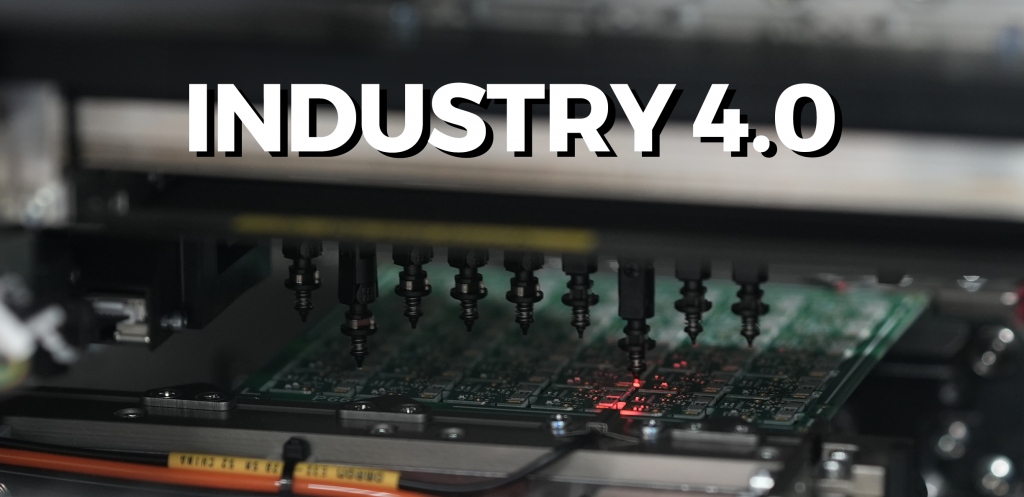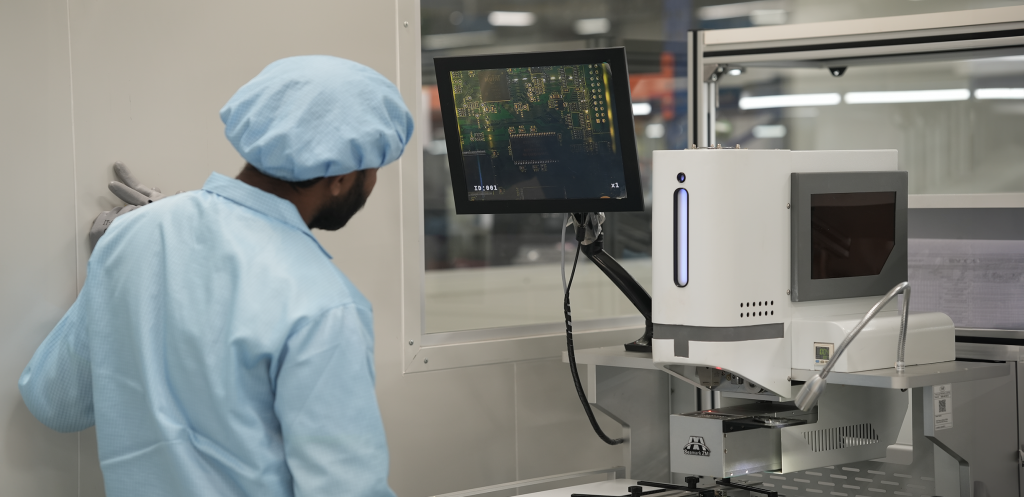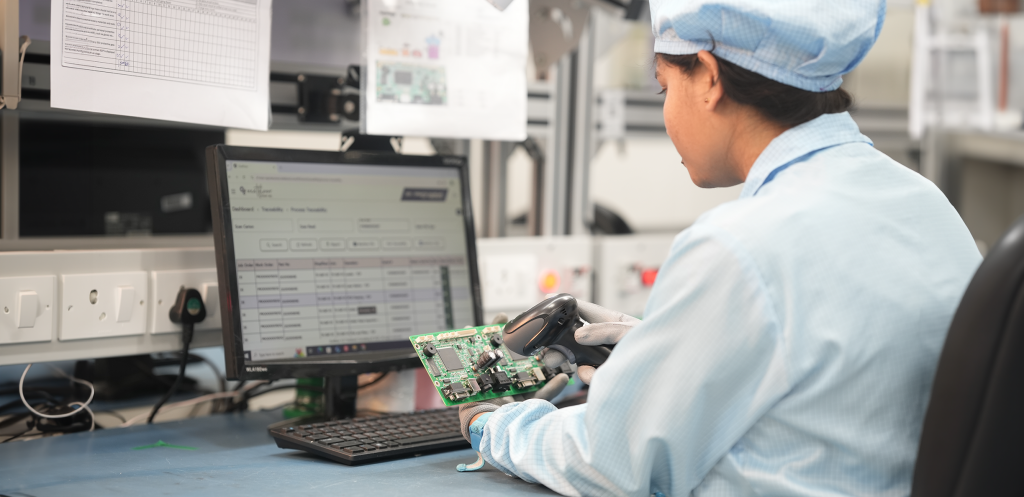In today’s dynamic landscape, Industry 4.0 is revolutionizing electronics manufacturing with automation, robotics, AI, and the Internet of Things (IoT). This digital transformation drives efficiency, precision, and adaptability in electronics production. By integrating these technologies, electronics manufacturers achieve higher productivity, reduced costs, and enhanced quality control—essential advantages in an increasingly competitive market.

Understanding Industry 4.0 and Its Impact on Electronics Manufacturing
Industry 4.0, often called the fourth industrial revolution, builds upon previous advancements in mechanization, electrification, and early automation. Now driven by digital technologies like IoT, big data, Artificial Intelligence (AI), Machine Learning (ML), robotics, and cloud computing, Industry 4.0 creates a highly connected, automated ecosystem. For electronics manufacturing, this transformation means real-time monitoring, precision control, and significantly optimized production processes.
Key Roles of Automation and Technology in Industry 4.0
Automation is a cornerstone of Industry 4.0, converting traditional assembly lines into smart, interconnected systems. Electronics manufacturing often requires intricate tasks such as component placement on circuit boards, testing, and final assembly. Here’s how Industry 4.0 and automation are driving positive changes:
1. Enhanced Precision and Quality Control
Automated systems using AI and machine vision offer meticulous quality control. In PCB assembly (PCBA), automated optical inspection (AOI) detects defects with remarkable accuracy, ensuring only high-quality boards progress in production. This reduces human error, minimizes waste, and maintains superior quality standards.

2 . Increased Production Speed and Efficiency
Robots and AI-powered machines perform repetitive tasks faster and more accurately than human operators, drastically increasing production speed. Automated pick-and-place machines in PCBmanufacturing can place thousands of components per hour, delivering unmatched efficiency and scalability.
3. Smart Data Collection and Real-Time Analytics
A primary advantage of Industry 4.0 is the collection and analysis of real-time data from IoT sensors on machines. Electronics manufacturers can monitor energy usage, machine uptime, and output, enabling predictive maintenance that prevents unexpected downtime and optimizes resource use.
4. Predictive Maintenance and Reduced Downtime
Predictive maintenance powered by AI minimizes downtime by identifying potential issues before they lead to equipment failure. This proactive approach extends machine life, ensures uninterrupted production, and boosts operational reliability.
5. Flexible and Customizable Production
With rising consumer demand for customized electronics, manufacturers are turning to flexible production methods. Automated systems in an Industry 4.0 environment quickly adjust to product variations, enabling “mass customization” without efficiency losses.
6. Improved Traceability and Compliance
Industry 4.0 simplifies traceability across the entire production chain, from raw materials to final assembly. Traceability is crucial for quality control and compliance in electronics manufacturing, allowing manufacturers to quickly address and resolve issues, thus upholding high standards.

Real-World Applications and Smart Manufacturing Systems
Electronics companies are already leveraging advanced Industry 4.0 solutions to optimize production. For instance, Surface Mount Technology (SMT) lines enhanced by IoT enable precise component placement, quality checks, and streamlined processes. At TVS Electronics, our Manufacturing Execution System (MES) integrates advanced control systems, enabling real-time monitoring of production, resource allocation, and equipment efficiency, creating a responsive and agile manufacturing setup.
Future Trends: The Evolution of Industry 4.0 in Electronics Manufacturing
Emerging trends in Industry 4.0 for electronics manufacturing include AI-driven predictive systems that reduce downtime, 5G and edge computing for faster data transmission, and digital twins that simulate production processes. These advancements will enable manufacturers to optimize efficiency, boost innovation, and stay competitive in a rapidly changing market.
Conclusion: Embracing Industry 4.0 for Competitive Advantage
The transformative impact of Industry 4.0 is more than just a trend; it’s essential for electronics manufacturers aiming to stay competitive in the global market. By adopting automation and Industry 4.0 solutions, manufacturers improve precision, flexibility, quality, and speed to meet modern demands.
To learn more about how TVS Electronics can integrate Industry 4.0 technologies into your manufacturing process, contact us today. Together, we can shape the future of electronics manufacturing.
-
-
-
-
PRODUCTS Transaction ProductsTrack & Trace ProductsSecurity & SurveillanceComprehensive Retail Solution (CORE) AIDC Solutions OneBox Solutions Spares OEM Models
-
-
-
-











scratch geometry dash
March 17, 2025 at 3:12 pmAs digital payments continue to dominate, adaptability and security will be key factors for businesses. It’s great to see advancements that enhance both customer experience and operational efficiency.
fall guys 3
March 31, 2025 at 2:03 pmVery good post. I wanted to let you know that I recently came across your blog and that I have been thoroughly enjoying reading your entries. In the end, I’ll be following your feed and hoping you post once more soon!
slope
April 1, 2025 at 3:07 pmWhat’s monthly rental?
wink latest mod apk
April 8, 2025 at 12:05 pmI can’t believe how awesome Wink Mod Apk is! It gives me access to all the cool premium stuff without spending a dime. Plus, it’s super fast and doesn’t crash. Honestly, it’s one of the best modded apps I’ve ever downloaded. Highly recommended for anyone who loves meeting new people!
Snow rider
April 11, 2025 at 7:00 amIndustry 4.0 is revolutionizing manufacturing. Think of it like leveling up in a game, but instead of swords and spells, it’s IoT, AI, and robotics. Real-time data flows like a perfectly groomed slope, allowing for precise control and optimized production. It’s like you are gliding down the virtual mountains in the Snow rider game. This allows for optimal strategy. This translates to efficiency and greater output.
Payment Dates
April 13, 2025 at 12:13 amIn today’s growing cashless retail environment, SASSA ensures that beneficiaries can conveniently receive their grant money using their Postbank Black Card or directly into their personal bank accounts. Grants are processed on scheduled pay dates, making it easier to access funds securely at major retail outlets without the need for cash withdrawals. Stay updated with the latest grant dates to avoid delays and plan your spending smoothly.
Dinosaur Game
April 14, 2025 at 1:26 pmIndustry 4.0 is revolutionizing electronics manufacturing! Real-time data analysis and automation are boosting efficiency. Think of it like the Dinosaur Game – the industry is constantly evolving, forcing companies to adapt and overcome obstacles at an ever-increasing pace. Embracing these technologies is key to staying ahead in this rapidly changing landscape, optimizing production, and achieving a competitive edge. It’s adapt or get left behind!
Fake phone number
May 4, 2025 at 12:52 pmTired of spam calls? Use a fake phone number from 7 Sim and keep your personal number completely private from unwanted marketing.
Men's Black Bondage Style Shirt
May 8, 2025 at 11:28 amYour blog post is very interesting. Your level of thinking is good and the clarity of writing is excellent. I enjoyed so much to read this post
flappy bird
May 8, 2025 at 12:37 pmThat’s a great overview of Industry 4.0’s impact! We’re seeing similar benefits in our own manufacturing processes – increased efficiency and fewer errors, definitely. For anyone curious about visualizing complex systems and getting hands-on with process flows (even in a gamified way!), I’ve found Flappy Bird surprisingly helpful for understanding the interconnectedness and challenges in a fast-paced environment. It’s a simple platform, but the underlying principles resonate.
color rush game
May 12, 2025 at 8:12 amIndustry 4.0 is revolutionizing electronics manufacturing by boosting efficiency, precision, and adaptability. Automation, AI, and IoT enable faster production, better quality control, and predictive maintenance. This transformation not only enhances productivity but also supports customization and compliance, giving manufacturers a competitive edge in a rapidly evolving market.
merge fellas
May 15, 2025 at 11:38 amI appreciate the depth of research and clarity in your writing. It took me a little while to read all of the comments, but I found the article to be quite intriguing.
Worldguessr
May 15, 2025 at 2:15 pmI love how Geoguessr Unlimited lets you explore the world freely without worrying about daily limits.
Hunter
May 16, 2025 at 12:59 pmgood
minecraft download
May 21, 2025 at 12:18 pmAdjust difficulty, controls, graphics, and interface elements to fit your device and play style perfectly.
Spotify Mod APK
May 23, 2025 at 4:05 pmBypass geo-restrictions and listen to content not available in your region.
11Winner
May 25, 2025 at 7:24 pmIf you’re looking to download 11Winner, make sure to get it from the verified source. I’ve been using it for a while and had a great experience so far — especially with the joining bonus!
kinemaster pro 2024
May 26, 2025 at 1:28 pmKineMaster Pro – Craft Bold, Brilliant Stories.